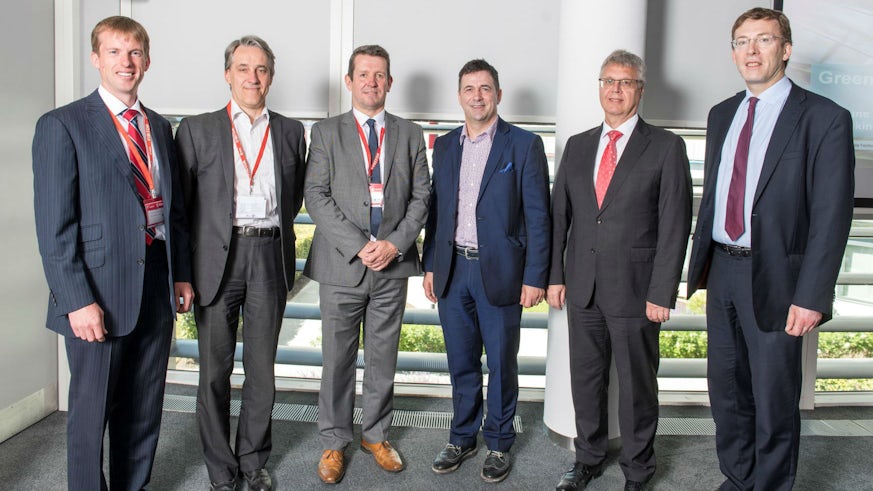‘Ammonia for power’ project wins award
16 May 2019

A ‘green power’ system that uses ammonia to store and release zero-carbon energy has won an award for innovation.
Cardiff University researchers worked alongside Siemens, Oxford University, and the Science and Technology Facilities Council as part of an Innovate UK project to pilot a unique project through a £1.5m ‘world-first’ proof-of-concept demonstrator at the Rutherford Appleton Laboratory in Harwell, Oxfordshire.
Cardiff established a partnership to create a new sustainable system that can generate and use power when required, and effectively store energy as ammonia when demand is low. The demonstrator shows the complete cycle of green energy where power from a wind turbine is converted into hydrogen and ammonia, stored and re-converted back to electricity.
Researchers from FLEXIS – a £24 million EU Regional Development Fund (ERDF) project designed to grow the energy systems research capability in Wales – participated in the development, showing the potential of ammonia as a hydrogen vector to support further green power generation developments in the Welsh region.
Welcoming the Sustainable Innovation Award, Dr Agustin Valera-Medina, Cardiff PI and Senior Lecturer in Cardiff University’s School of Engineering said: “We are delighted to win this accolade. Before this partnership, nobody had previously proposed the integration of concepts to demonstrate the potential of ammonia as an energy storage vector. Particularly, the venture astonished the international combustion community as a consequence of the use of ammonia as energy vector due to its low reactivity and its ability to generate undesirable pollutants.
“The proof-of-concept facility at Harwell has shown the power of ammonia can be harnessed to provide a practical, flexible next-generation system for energy storage, transportation and power generation.”
The project began after Siemens identified a gap in the future market for a zero-carbon chemical storage medium which is easily contained and can be transported to where it is needed.
Energy can be released from ammonia (NH3)either in the traditional way by combustion in an internal combustion or gas turbine engine, or by ‘cracking’ it back into nitrogen and hydrogen and using the hydrogen in a fuel cell – to power electric vehicles, for example.
Ammonia can be used as a fuel for power generation, delivering electricity at times when renewable energy is not available, such as on calm days or at night, or during Winter by using energy stored during the Summer.
Ian Wilkinson, Programme Manager, Siemens Corporate Technologies, said: “This award is testament to a truly innovative and excellent partnership between industry and academia. Meeting our decarbonisation targets is a big challenge for society. Carbon-free chemical energy storage – including Green Ammonia – has the potential to work alongside other storage methods such as batteries, and help increase the penetration of renewable power into our energy systems."
With help from the team at Cardiff University, the demonstrator has shown that Green Ammonia is a viable option and can help reduce carbon emissions from existing industrial processes as well as provide a means for transporting and storing renewable energy in bulk.
The Harwell demonstrator opened last year and was funded with £500,000 from Siemens and £1m from government innovation agency Innovate UK.
The partnership has brought wide-ranging academic benefits to the University-led consortium including 20 Cardiff-authored articles, new University collaborations with more than 20 institutions worldwide, a Royal Society Briefing collaboration on the benefits of ammonia, and the start of five unique PhD/MSc projects around ammonia for power with secondments to top international universities.
The Awards, on 3 June, are organised by Cardiff University Innovation Network, which has promoted business-university interactions for more than 20 years.
Share this story
The School has world leading research, strong links with industry, and a friendly and supportive teaching environment make us one of the leading engineering schools in the UK.


